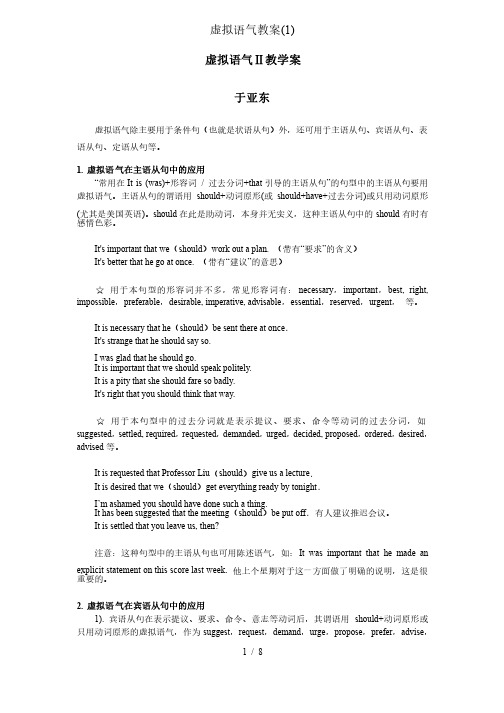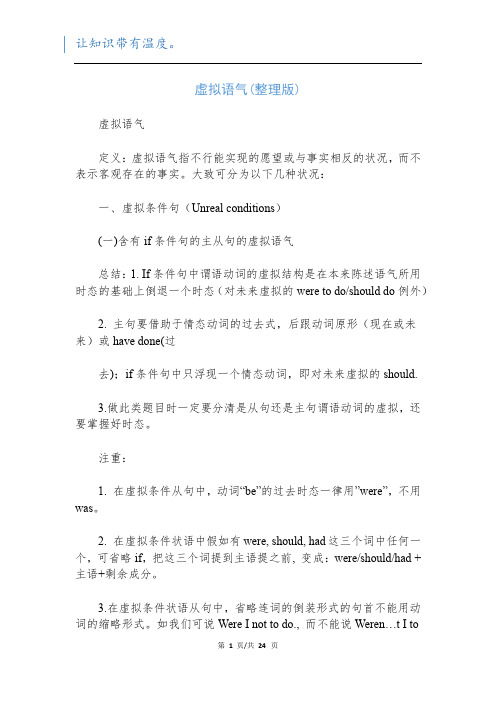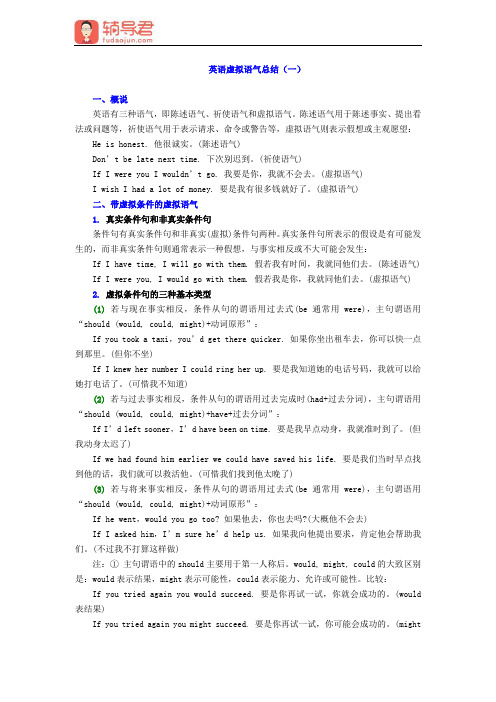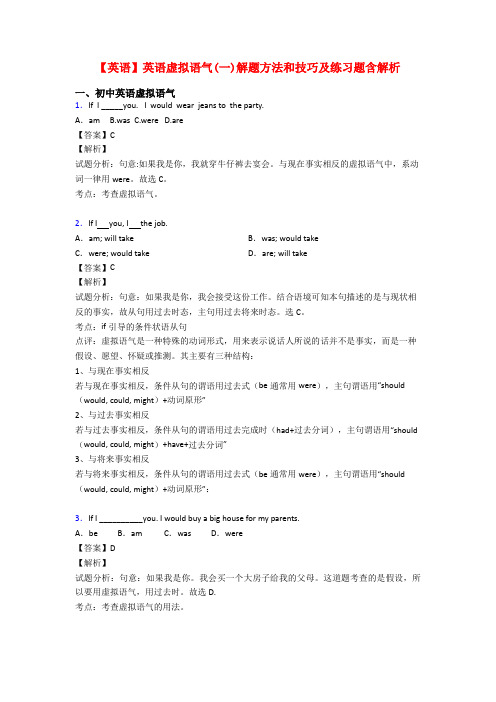(一)虚拟语气
9.18.虚拟语气(1)

I wish I _h_a_d_n_'t__e_at_e_n(eat) so much watermelon yesterday.
as if/as though 虚拟用法同wish
他那样对待我, 好像我是陌生人似的。
He treats me as if I _w_e_r_e a stranger.
• 2. 定义:用来表示说的话不是事实, 或者是不可能发生或可能性比较小的 情况,而是一种愿望,建议,假设的 语气叫虚拟语气。
虚拟语气
Types
1. If 型
与现在事实相反虚拟
If I were a bird, I would have two wings. If I had two wings, I could fly in the sky.
He talks about Rome as if he
_h_a_d_b_e_e_n_(be) there before.
if only 虚拟用法同wish:
Had you come earlier, you would have met him.
If it should rain tomorrow, we would not go climbing.
Should it rain tomorrow, we would not go climbing.
虚拟语气
虚拟语气
高考命题趋势
高考对虚拟语气的考查侧重于:在非真 实条件状语从句中的使用,含蓄条件 句中的用法,名词从句中的用法及一 些特殊句式中的用法。今后高考仍然 会重视对虚拟语气句型的考查,而且 试题语境会更灵活,考查角度更加多 样化。我们要在语境中准确理解运用 。
知识目标
1 会使用if 条件句中虚拟语气句式 2 能使用虚拟语气的几种特殊句式造句
虚拟语气教案(1)

虚拟语气教案(1) 1 / 8虚拟语气Ⅱ教学案于亚东虚拟语气除主要用于条件句(也就是状语从句)外,还可用于主语从句、宾语从句、表语从句、定语从句等。
语从句、定语从句等。
1. 虚拟语气在主语从句中的应用“常用在It is (was)+形容词形容词/ 过去分词+that 引导的主语从句”的句型中的主语从句要用虚拟语气。
主语从句的谓语用should+动词原形(或should+have+过去分词)或只用动词原形(尤其是美国英语)。
should 在此是助动词,本身并无实义,这种主语从句中的should 有时有感情色彩。
感情色彩。
It's important that we (should )work out a plan. (带有“要求”的含义)的含义) It's better that he go at once. (带有“建议”的意思)的意思)☆ 用于本句型的形容词并不多,常见形容词有:necessary ,important ,best, right, impossible ,preferable ,desirable, imperative, advisable ,essential ,reserved ,urgent , 等。
等。
It is necessary that he (should )be sent there at once . It's strange that he should say so.I was glad that he should go.It is important that we should speak politely. It is a pity that she should fare so badly. It's right that you should think that way. ☆ 用于本句型中的过去分词就是表示提议、要求、命令等动词的过去分词,如suggested ,settled, required ,requested ,demanded ,urged ,decided, proposed ,ordered ,desired ,advised 等。
虚拟语气-1..

3、可能违背将来事实的假设 这里指的是将来不大可能发生的假设,或者虽有可能发生, 说话人主观上不希望发生的假设。这种假设相当于汉语中 常用的“万一”,“居然”,“竟然”等含义。例如: If he should fail, we would encourage him to try again. 万一他失败,我们就鼓励他再试一次。 If I were to do it, I would do it in a different way. 要是我来做这件事,我会是另外一种做法。 We would wipe them out if they should attract us. 如果他们胆敢进攻,我们就将他们消灭。 If it should rain tomorrow, what could we do? 万一明天下雨,我们能做些什么呢? If the rocket should fail in a few seconds, it would certainly explode.如果火箭几秒钟内竟然向下坠落,那就一定会爆炸。
5、连接词 if 的省略 如果条件从句的谓语包含有had, should 或 were,有时 if 可以 省略。这时had,should 或 were 要移到主语前面,形成倒装。 (这种句型主要见于书面形式。) Had he not been ill, he might have come. 要不是生病,他是会来的。 Were I to do it, I would do it in a different way. 要是我来做这件事,我会是另外一种做法。 Should it rain tomorrow, what could we do. 万一明天下雨,我们能做些什么呢? Were it not for his help, we couldn’t have got over the difficulties. 如果不是因为他的帮助,我们就克服不了这些困难。
虚拟语气(整理版)

虚拟语气(整理版)虚拟语气定义:虚拟语气指不行能实现的愿望或与事实相反的状况,而不表示客观存在的事实。
大致可分为以下几种状况:一、虚拟条件句(Unreal conditions)(一)含有if条件句的主从句的虚拟语气总结:1. If条件句中谓语动词的虚拟结构是在本来陈述语气所用时态的基础上倒退一个时态(对未来虚拟的were to do/should do例外)2. 主句要借助于情态动词的过去式,后跟动词原形(现在或未来)或have done(过去);if条件句中只浮现一个情态动词,即对未来虚拟的should.3.做此类题目时一定要分清是从句还是主句谓语动词的虚拟,还要掌握好时态。
注重:1. 在虚拟条件从句中,动词“be”的过去时态一律用”were”,不用was。
2. 在虚拟条件状语中假如有were, should, had这三个词中任何一个,可省略if,把这三个词提到主语提之前, 变成:were/should/had +主语+剩余成分。
3.在虚拟条件状语从句中,省略连词的倒装形式的句首不能用动词的缩略形式。
如我们可说Were I not to do., 而不能说Weren…t I todo。
4.在表示与未来事实相反的条件句中,只能用should,而不能用would,could和might 等。
5.主句中的should通常用于第一人称,would,could以及might 可以用于各种人称(二)混合虚拟条件句当假设条件句的主句和从句不表达同一时光的时候,我们应使用混合时光的假设条件句,动词的形式要分离按照它所表示的不同时光做相应的调节,变法同if条件虚拟句的主从句谓语动词变法。
(三)含蓄条件句在含蓄条件句中,我们常使用otherwise ,or, but以及with ,without ,but for开头的介词短语来代替条件句。
注:1. but for =1)If it weren’t fo r(对普通现在时虚拟)2)If it hadn’t been for(对普通过去时虚拟)2.分句(直陈)+otherwise/or+分句→对主句谓语动词的虚拟3.分句(对主句谓语动词虚拟)+but/unfortunately+分句(直陈)4.with/without/but for+宾语+句子(对主句谓语动词虚拟)填空:1. 假如现在不下雨的话, 我们就出去野餐了。
英语虚拟语气总结(一)

英语虚拟语气总结(一)一、概说英语有三种语气,即陈述语气、祈使语气和虚拟语气。
陈述语气用于陈述事实、提出看法或问题等,祈使语气用于表示请求、命令或警告等,虚拟语气则表示假想或主观愿望:He is honest. 他很诚实。
(陈述语气)Don’t be late next time. 下次别迟到。
(祈使语气)If I were you I wouldn’t go. 我要是你,我就不会去。
(虚拟语气)I wish I had a lot of money. 要是我有很多钱就好了。
(虚拟语气)二、带虚拟条件的虚拟语气1.真实条件句和非真实条件句条件句有真实条件句和非真实(虚拟)条件句两种。
真实条件句所表示的假设是有可能发生的,而非真实条件句则通常表示一种假想,与事实相反或不大可能会发生:If I have time, I will go with them. 假若我有时间,我就同他们去。
(陈述语气) If I were you, I would go with them. 假若我是你,我就同他们去。
(虚拟语气)2.虚拟条件句的三种基本类型(1)若与现在事实相反,条件从句的谓语用过去式(be通常用were),主句谓语用“should (would, could, might)+动词原形”:If you took a taxi,you’d get there quicker. 如果你坐出租车去,你可以快一点到那里。
(但你不坐)If I knew her number I could ring her up. 要是我知道她的电话号码,我就可以给她打电话了。
(可惜我不知道)(2)若与过去事实相反,条件从句的谓语用过去完成时(had+过去分词),主句谓语用“should (would, could, might)+have+过去分词”:If I’d left sooner,I’d have been on time. 要是我早点动身,我就准时到了。
虚拟语气(经典)

⑦(2008·重庆一中)________ I had time,I would have
checked my answers again.
A.If
B.Unless
C.Had
D.When
解析:本题考查虚拟语气条件状语从句省略if时的倒装
(dǎo zhuānɡ)现象。
答案:C
精品PPT
⑧(2008·江 苏 兴 化 (xīnɡ huà))What would have happened,________,as far as the river bank?
精品PPT
Should there be a flood,what should we do?万一 (wànyī)发生洪水,我们怎么办?(=If there should be a flood)
Were he to come,I might go with him. 他若是来,我就可能跟他去。(=If he were to come)
would have met him. 要是你早来几分钟的话,你就能见到他了。
(与将来事实可能相反) 2. If it were sunny tomorrow, I would come to see
you. 明天要是天气(tiānqì)好的话,我来看你。
(与现在事实相反) 3. If I were you, I would go at once. 假如我是你的话,我会马上走。
精品PPT
5.错综时间条件句 当条件从句表示的动作和主句表示的动作 发生的时间不一致的时候(如一个发生在过去, 一个发生在现在),动词的形式(xíngshì)要根据 它所表示的时间来调整。例如: If he had listened to me,he would not be in trouble now.如果他当时听了我的话,现在 就不会遇到麻烦了。 If the weather had精品PbPT een more favorable,
英语虚拟语气(一)解题方法和技巧及练习题及解析

英语虚拟语气(一)解题方法和技巧及练习题及解析一、初中英语虚拟语气1.If I _____you. I would wear jeans to the party.A.am B.was C.were D.are【答案】C【解析】试题分析:句意:如果我是你,我就穿牛仔裤去宴会。
与现在事实相反的虚拟语气中,系动词一律用were。
故选C。
考点:考查虚拟语气。
2.--- If I_______ one million dollars, I would give it to medical research.---If I _______ you, I would give it to charity.A.will have, am B.would have, was C.had, were D.have, is【答案】C【解析】考察虚拟语气。
第一空,虚拟语气,与现在相反,用过去时。
第二空,虚拟语气,与现在相反,用过去时,be动词用were。
故选C3.--What would you do if you ____ a million dollars?--I’d give it to the charityA.win B.won C.will win D.is to win【答案】B【解析】试题分析:句意:如果你赢了一百万美元,你要做什么?——我会把它捐给慈善机构。
结合语境可知条件从句中描述的是与将来相反的事实,故用一般过去时态,选B。
考点:if引导的条件状语从句点评:虚拟语气是一种特殊的动词形式,用来表示说话人所说的话并不是事实,而是一种假设、愿望、怀疑或推测。
判断是真实条件句还是非真实条件句。
只有在非真实条件句中才使用虚拟语气。
通过句子意思,看假设的条件是否能够实现,能够实现是真实条件句,不能使用虚拟语气;假设的条件不能实现则是非真实条件句,要用虚拟语气.判断这个假设是与哪个事实相反。
1、与现在事实相反若与现在事实相反,条件从句的谓语用过去式(be通常用were),主句谓语用“should (would, could, might)+动词原形”2、与过去事实相反若与过去事实相反,条件从句的谓语用过去完成时(had+过去分词),主句谓语用“should (would, could, might)+have+过去分词”3、与将来事实相反若与将来事实相反,条件从句的谓语用过去式(be通常用were),主句谓语用“should (would, could, might)+动词原形”:4.–I argued with my best friend. What should I do?--If I ________ you, I would say sorry to her.A.am B.was C.are D.were【答案】D【解析】试题分析:句意:我和我最好的朋友吵架了。
【英语】英语虚拟语气(一)解题方法和技巧及练习题含解析

【英语】英语虚拟语气(一)解题方法和技巧及练习题含解析一、初中英语虚拟语气1.If I _____you. I would wear jeans to the party.A.am B.was C.were D.are【答案】C【解析】试题分析:句意:如果我是你,我就穿牛仔裤去宴会。
与现在事实相反的虚拟语气中,系动词一律用were。
故选C。
考点:考查虚拟语气。
2.If I you, I the job.A.am; will take B.was; would takeC.were; would take D.are; will take【答案】C【解析】试题分析:句意:如果我是你,我会接受这份工作。
结合语境可知本句描述的是与现状相反的事实,故从句用过去时态,主句用过去将来时态。
选C。
考点:if引导的条件状语从句点评:虚拟语气是一种特殊的动词形式,用来表示说话人所说的话并不是事实,而是一种假设、愿望、怀疑或推测。
其主要有三种结构:1、与现在事实相反若与现在事实相反,条件从句的谓语用过去式(be通常用were),主句谓语用“s hould (would, could, might)+动词原形”2、与过去事实相反若与过去事实相反,条件从句的谓语用过去完成时(had+过去分词),主句谓语用“should (would, could, might)+have+过去分词”3、与将来事实相反若与将来事实相反,条件从句的谓语用过去式(be通常用were),主句谓语用“should (would, could, might)+动词原形”:3.If I __________you. I would buy a big house for my parents.A.be B.am C.was D.were【答案】D【解析】试题分析:句意:如果我是你。
我会买一个大房子给我的父母。
这道题考查的是假设,所以要用虚拟语气,用过去时。
- 1、下载文档前请自行甄别文档内容的完整性,平台不提供额外的编辑、内容补充、找答案等附加服务。
- 2、"仅部分预览"的文档,不可在线预览部分如存在完整性等问题,可反馈申请退款(可完整预览的文档不适用该条件!)。
- 3、如文档侵犯您的权益,请联系客服反馈,我们会尽快为您处理(人工客服工作时间:9:00-18:30)。
第一节:虚拟语气
虚拟:假的,不真实的。
语气:英语中的语气指的是动词的表现形式,
If Zhang Ziyi married me, I would give her all that I have.
一.虚拟条件句:
If I were you, I would choose Jolin.
If I knew her number, I would call her at once.
B: 与过去事实相反
If you had told me earlier, I would not have married him.
If I had won the lottery, I would have come to Zhang Ziyi.
C: 与将来事实相反
married someone
If she were to marry somesone tomorrow, I would jump into the river with her photos.
should marry someone
2. 两种变形
A: 在虚拟条件句中若有were,had, should时可以省略If 而把这些词提至主语之前(句首),主句不变。
If I were you, I would choose Jolin.
→Were I you, I would choose Jolin.
If you had told me earlier, I would not have married him.
→Had you told me earlier, I would not have married him.
If I had won the lottery, I would have come to Zhang Ziyi.
→Had I won the lottery, I would have come to Zhang Ziyi.
If she should marry someone tomorrow, I would jump into the river with her photos →Should she marry someone tomorrow, I would jump into the river with her photos B: 介词短语代替虚拟条件句:but for--- 要不是---;幸亏---
without--- 如果没有---
If I had not had beriberi, we would not have broken up!
→Without beriberi, we would not have broken up!
If it were not for your help, we could not be together again.
→But for your help, we could not be together again.
二.wish 后的虚拟语气
结构:主语+ wish + that 从句
A:与现在事实相反:动词用过去式,be动词一律用were
I wish I knew her telephone number.
I wish my mother were here now!
B: 与过去事实相反:had + 过去分词或could + have + 过去分词
I wish I had been here yesterday.
I wish I could have gone to your birthday party yesterday.
C: 表示将来不太可能实现的愿望:would/could/might + 动词原形
I wish you wouldn’t be so nervous next time.
He wished she might do better next time.
三特殊词后的虚拟语气
当在主句中出现动词advise, suggest, request, require, demand, propose, order, insist, command, recommend等动词或它们的名词advice, suggestion, request, requirement, demand, proposal, order时从句中要用虚拟语气
从句谓语动词的形式:(should)+ 动词原形
She insisted that the seats (should) be booked in advance.
She suggested that we (should) hold a meeting tonight.
He issued the order that the troops (should) withdraw at once.
It is suggested that the boy (should) be sent to the hospitalat once.
My desire is that all the members of the family (should) gather once a year.
注意:①当suggest 不作“建议”解,而是“暗示,表明”的时候其后的宾语从句要用陈述语气
The look on your face suggests that you are very tired.
All these facts suggest that he is not guilty.
②当insist 不作“坚持要求”解,而是“坚持认为”时其后的宾语从句也要用陈述语
气
The doctor insisted that the boy was badly hurt and that he should be sent to a better hospital without delay.
四.特殊句子中的虚拟语气
1. It is important/necessary/essential that ---- (做---是很重要的/很有必要的)
从句中的谓语动词形式:(should)+ 动词原形
It is important that he (should) prepare his lesson before the exam.
2. or/otherwise (否则)引导的并列句中的虚拟语气:
其后并列句中的谓语动词的形式要与虚拟条件句的主句的谓语动词相一致
I didn’t know that he was a liar, or/otherwise I wouldn’t have believed him.
He is very busy now, or/ otherwise he would help us.
3.It is (high, about) time that ---- (早该做----的时间到了,实际上已经有些晚了)
that 从句中的谓语动词的形式:动词用过去式,be 动词一律用were
It is time that we went to bed.
It is high time that we were off.。
